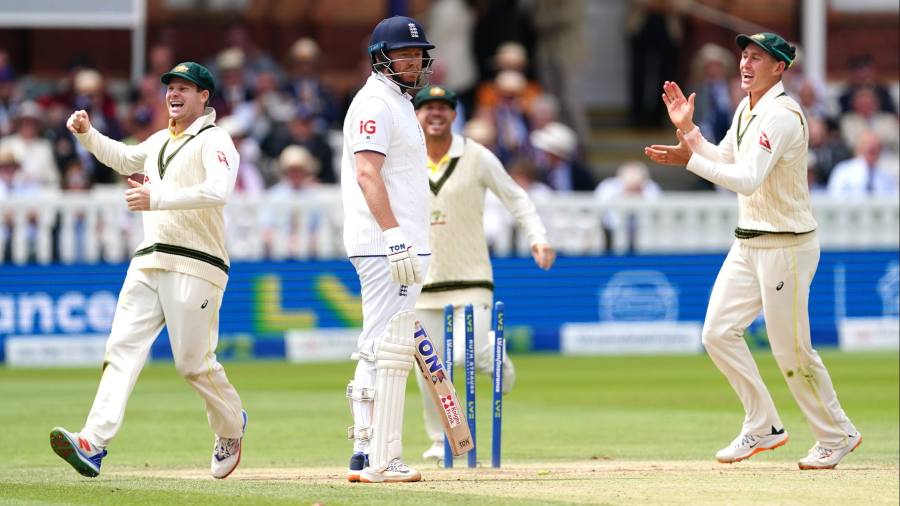Receive free Cricket updates
We’ll send you a myFT Daily Digest email rounding up the latest Cricket news every morning.
In the old days, the Australian cricketers’ normally quadrennial tours of the UK followed a languid pattern: preparatory games around the shires culminating in five “Ashes” Test matches against England at decent intervals in high summer.
This year the whole thing is being squeezed into six weeks without touching the prime holiday month of August when children could and should be inspired to head to the parks and beaches with bat and ball. Mad. Almost as mad as removing the national summer game from mainstream television, a bleak and avaricious decision taken nearly 20 years ago.
So the two teams resume hostilities on Thursday at Headingley in Leeds, the OK Corral of English cricket, after just three days’ rest — barely enough for the metaphorical blood to be cleaned from the game’s holy of holies, the pavilion at Lord’s Cricket Ground in London’s St John’s Wood, where several spectators allegedly abused Australian players on Sunday. Certainly not enough for the real wounds to heal from the players’ bodies after a notably physical contest that lasted almost the full five allotted days. And emphatically not enough to dissolve the bad blood that now exists between the two teams.
The casus belli was the Australian wicketkeeper Alex Carey successfully throwing the ball at the stumps at the end of an over when the England batsman Jonny Bairstow, seeking no advantage, instinctively wandered out of his ground but before the umpire had formally called “Over”. Bairstow was then given out stumped by the umpire, under Law 20.1.1.1 (truly).
This happened at a crucial stage of the game and probably decided the match and quite likely the Ashes series in which Australia now stand 2-0 up. Such a deficit has only once been overcome in this 146-year-old sort-of war, which earned its name after English cricket was deemed to have been “cremated and the ashes taken to Australia” after the first Aussie Test victory in England.
But this is not war, it’s a game and one that prides itself on “the spirit of cricket”. The Australian captain Pat Cummins could easily have called Bairstow back and become a candidate for the Nobel peace prize, win or lose. As it is, as the new batsman, Stuart Broad, told Carey on his arrival at the wicket, “That’s all you’ll be remembered for” — which is probably true.
A number of English commentators, led by the former England captain Mike Atherton, went full-on legalistic and said Bairstow deserved his fate for being dozy. On the other hand, Peter Fitzsimons of the Sydney Morning Herald said: “I remain uneasy.”
On the whole the two nations took entrenched positions, including both prime ministers, Rishi Sunak and Anthony Albanese. An exclusive if cut-price opinion poll for the Financial Times showed that 100 per cent of the English cricketing public sided with Bairstow. Bob the postman, Bennie in the village shop and Paul the hairdresser all told the research team that the dismissal was “not cricket”.
The Australians were able to indulge in a great deal of you-tooism, citing examples of dodgy behaviour by every Englishman from the Victorian totem WG Grace to examples implicating both Bairstow and the infuriated Broad. Then again, it is only five years since the Sandpapergate scandal when two members of the current Australian side, Steve Smith and David Warner, were at the heart of a blatant ball-tampering outrage.
Some commentators shook their heads this week and said it was all to do with a modern world that valued success above amity. Actually, in cricket there are many more international friendships because so many players take part together in the various T20 Premier Leagues, which purvey cricket that is brief, lucrative, popular and essentially crap. Nothing in their brief history can compare with the compelling drama of these Ashes Tests. Among the friendships made in the long dull days and nights in luxury Indian hotels have been that between Cummins and the current England coach, Brendon “Baz” McCullum.
My own view is that this incident transcends cricket but, like much of this game, as a pointer to life in general. If an employee uses the office stapler on a personal document, that constitutes theft, just as Bairstow was technically at fault. But there is a line somewhere between one staple and annexing the entire stationery cupboard.
This cannot be quantified but can be recognised by everyone involved. Cricket’s governance document ends with Law 42 on players conduct which is generally held to be supplemented by the unwritten Law 43: “When all else fails, common sense applies.” I think the Aussies broke that. And what goes around comes around.
All this business has now overshadowed the big question of the series: the efficacy of Bazball, the devil-may-care form of Test cricket conceived by McCullum and brought to life by his captain Ben Stokes, its most brilliant exponent. The whole plan of audacious attack worked almost perfectly for a year until it first met England’s most implacable opponents three weeks ago.
Four years ago, long before the New Zealander McCullum took the job, Stokes played one of his most mesmerising innings to secure a victory over the Aussies at Headingley. This time, if England lose or even draw, the Ashes will remain with Australia, who, as holders, only have to halve the series to retain “The Urn”.
Given the response of the spectators at Lord’s, the far more hard-bitten Yorkshire public could come up with something very far removed from the spirit of cricket. If England look like losing, they could just boo both teams equally. And their kids will give up and go back to soccer.
Read the full article here




